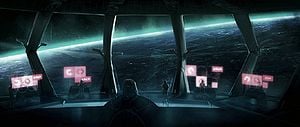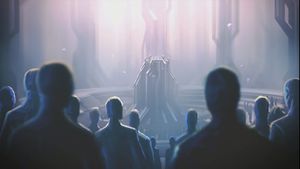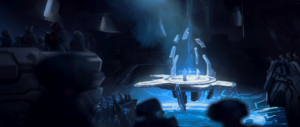Ecumene
From Halopedia, the Halo wiki
| Ecumene | |
|---|---|
 The Eld, a common symbol used to represent the Forerunners | |
| Empire overview | |
|
Type: |
Intergalactic empire |
|
Head of state: |
|
|
Executive branch: |
|
|
Legislative branch: |
|
|
Judicial branch: |
|
|
Government branches: |
|
| Societal overview | |
|
Capital: |
|
|
Official language(s): |
Jagon, other Forerunner languages |
|
Official religion(s): |
|
|
Official script(s): |
|
|
Holidays: |
|
|
Tier 1 | |
| Historical overview | |
|
Formation: |
|
|
Reorganization: |
|
|
Dissolution: |
|
- "The Forerunners were sophisticated above all other empires and powerful almost beyond measure. Our ecumene spanned three million fertile worlds. We had achieved the greatest heights of technology and physical knowledge."
- — The IsoDidact reflecting on the ecumene's former power and influence[1]
The ecumene is the translated name for the Forerunner empire which existed over 100,000 years ago. It stretched across the galaxy and consisted of three million habitable worlds at its peak.[1] The political center of this empire was known as the Maethrillian, the Capital city, a massive planetoid structure containing multiple cities. Maethrillian itself was located in the Orion complex, which was considered to be the center of the ecumene. This region of space was bordered by the Jat-Krula, often translated as the "Maginot Sphere", a defensive boundary consisting of millions of Line installations.[2]
History[edit]
Early history[edit]
The ecumene was established sometime before 10,000,000 BCE, centered in the Orion complex. At one point the Precursors made a decision to pass down the Mantle to humans instead of the Forerunners. Although the specifics and causes of the events are unclear, the Forerunners furiously rebelled against the Precursors,[3][4] eventually leading to the latter retreating to Path Kethona, outside the galaxy. However, several Forerunners followed with an enormous fleet of warships. A majority of the Precursors were eradicated by the following Forerunners. The Forerunners responsible for the near-genocide were unable to bear the burden of what they had done. Ashamed, many of them exiled themselves on a barren planet located in the Spider.[5] The Builder and the Warrior-Servant commanders of the ecumene worked to suppress the truth and realities of the war. Any individual that attempted to learn of the past was silenced or exiled to a Cryptum.[6][7]
Now the dominant race in the galaxy, the Forerunners and their ecumene began to expand. This often resulted in several sapient species being forcibly relocated from their homeworlds to allow the ecumene to colonize the world.[8] Over the course of their history, the ecumene experienced a number of civil wars, one of which took place over half a million years before their war against the Flood. To safeguard the Orion complex—the center of the ecumene's governance—during these conflicts, the Forerunners constructed the Maginot Sphere, an immense array of defensive installations spread out in a sphere which completely surrounded the Orion complex.[2] During these civil wars, the Builders slowly made themselves the political leaders of the ecumene, rising to supremacy and removing the cultures of the Warrior-Servants and the Miners.[9]
The Capital, the center of the ecumene and the seat of the Ecumene Council, was constructed around 122,990 BCE.[10] At some point, the ecumene fought a series of bloody civil wars known as the Kradal conflicts in the galactic center.[11][12]
War with humanity[edit]

- Main article: Human-Forerunner wars
By 150,000 BCE, the ecumene was the largest empire in the Milky Way.[13] The expansion of the ecumene began reaching human space. Looking to escape from the Forerunners' dominion, the human empire expanded throughout the Orion Arm and eventually built an impressive empire consisting of at least 20,000 worlds in a thousand systems, rivaling the might of the ecumene.[14]
When the human empire was at war with the Flood, human fleets under the command of Forthencho, Lord of Admirals were sterilizing planets, home to other species, with Flood infestations. When worlds in the ecumene began to become infected by the Flood, they were immediately targeted for orbital bombardment, killing millions of Forerunners in the process. The Forerunners did not believe that the Flood was a credible threat to the ecumene and began attacking humanity in response, believing that the humans were attacking other worlds to expand.[15] While the humans were successful at holding their own against the Forerunner military, despite also fending off the Flood, humanity never came closer than 15,000 light-years of the Orion complex.[16]
The Forerunners took control of numerous former human colonies in the war, expanding the ecumene. Humanity's homeworld, Erde-Tyrene, was one of the first planets taken from the human empire, while its neighbouring planet, Edom, was used as a mining colony.[17] The San'Shyuum's home system also became encompassed by the ecumene, with the Deep Reverence orbiting Janjur Qom to ensure the species' exile on their homeworld for aiding humanity throughout the war.[18] Eventually, after a fifty-year standoff at Charum Hakkor, the human empire was defeated by the ecumene's military. As punishment for the human's crimes, the Ecumene Council ordered the species' regression to a pre-technological state.[19]
Forerunner-Flood war[edit]
- Main article: Forerunner-Flood war
After the war with humanity, the possible threat of the Flood was realized by the ecumene government. This led to a split in the ecumene's politics, with the Master Builder Faber and the Ecumene Council wishing to construct the devastating Halo Array, while the Didact and his Prometheans favored the shield worlds. Eventually, Faber won the political battle and the Didact was exiled from the ecumene. The construction of the Halo Array began shortly after.[9] Roughly nine thousand years after their war with the humans, Seaward, a Forerunner isolationist colony on the edge of the ecumene, was attacked by the Flood. This began the galactic war that eventually led to the dissolution of the ecumene. The Flood began to infect thousands of Forerunner worlds, leading to the deaths of billions of Forerunners and other sapient species. The highest levels and tiers of the Forerunner Fleet Command began to realize that Forerunner species' extinction was plausible.[20] While the Halo Array's construction was completed, the Ecumene Council remained reluctant to activate them. During a San'Shyuum rebellion on their homeworld, Faber fired Installation 07 on the planet, nearly eradicating the entire species. Faber and the Halo Array were brought back to the Capital and Faber was stripped of his title and powers. This led to the Ecumene Council undergoing a radical change, with most of its Builder-aligned members being replaced by younger councilors.[21]

While the Halo Array was deemed too destructive and were to be decommissioned at the Capital, the Flood led by the defected command and control AI Mendicant Bias invaded the Capital system aboard Installation 07.[22] The battle led to the loss of the Capital and the deaths of many political commanders in the ecumene when Installation 07 was fired.[23] In the final years of the war, over 500,000 star systems were infected by the Flood. The Flood soon controlled two-thirds of the ecumene; these areas were referred to as Burns.[24] Eventually, the Forerunners began relying on the Maginot Sphere, which only protected the ecumene's core worlds in the Orion complex. This left the rest of the ecumene to fend for themselves.[2]
When the Orion complex became overrun by the Flood, ecumene command retreated to the greater Ark along with the remaining Forerunner population. While small pockets of survivors still existed throughout the ecumene, the greater Ark was now the Forerunners' last bastion, housing the rest of the ecumene's military and political commanders.[25] The ecumene's leadership decided that the only remaining option was to fire the remaining Halo installations, stopping the Flood before it could expand beyond the galaxy. Soon after this decision, the Flood attacked the greater Ark and destroyed it. With most of the Forerunner leadership and population dead, the few surviving Forerunners led by the IsoDidact journeyed to Installation 00, the lesser Ark, its location still hidden from the Flood. The IsoDidact had the Halos distributed across the galaxy and activated the rings, killing all sentient life of sufficient biomass in the Milky Way, including any surviving Forerunners within the range of the Halo effect.[26]
Dissolution[edit]
The IsoDidact and numerous Lifeworkers present on Installation 00 survived the firing of the Halo Array. The lifeforms sheltered on the Ark were eventually returned to their homeworlds and reintroduced them to their native ecosystems, now free of the Flood. After the re-seeding effort was finished, the surviving Forerunners left the galaxy, vowing to exclude themselves from the affairs of other species out of guilt over their failure as galactic custodians.[27]
100,000 years later, between July 22 and July 24, 2557, the Ur-Didact repeatedly contacted Catalog via a node located on Mars and asked to take control of the ecumene; Catalog rejected his requests.[28]
Government and politics[edit]
- "The ecumene has become confused. The Council steeps itself in lies and dishonor."
- — The Didact on the corruption in the ecumene and the Old Council
The primary governing body of the ecumene was known as the Ecumene Council. Based in the Capital, it was led by the First Councilor, composed of five hundred councilors from various rates, and supported by a network of ancillas known as the Council metarchy.[29] The ecumene's primary judicial institution, known as the Capital Court, which could be assembled into the Supreme Mantle Court in times of great crisis.[30] After the Master Builder Faber used Installation 07 to quell a rebellion that resulted in the deaths of a majority of the remaining San'Shyuum, a revolutionary party of younger councilors opposed to the Master Builder took command of the Ecumene Council.[21] A majority of the Council was replaced by new, mostly younger, councilors that were appointed through brevets.[30] This Council became referred to as the "New Council", while the one led by Faber was referred to as the "Old Council".[31]
The Juridical rate was charged with investigating criminal actions by citizens of the ecumene, as well as preventing crimes from being committed. The head of the Juridical rate was known as the Master Juridical.[32] Around 97,445 BCE, the Juridical rate was effectively shut down due to the capture of several Juridicals by the Flood. The Flood used the captured Juridicals to access access the Juridical network and spread the logic plague to Catalog and ancillas. As a result, Forerunner legal proceedings in the ecumene were put on hold indefinitely.[24]
In the final years of the ecumene, corruption began to encompass even the legal Juridical rate. The Builder rate, led by Faber, gained control of the Old Council and Faber ruthlessly eliminated all of his opposition in positions of power.[33] The corrupt Juridicals ensured the Master Builder's political dominance among the ecumene and allowed him to pursue his own agenda.[34] Ultimately, due to Faber's ruthlessness at Janjur Qom, he was temporarily stripped of his power, although his political power was restored during the Flood's attack on the greater Ark.[35]
Military[edit]

A majority of the ecumene's military consisted of the members of the Warrior-Servant rate, traditionally tasked with defense and warfare in the Forerunner ecumene.[36] Despite this, the Warrior-Servants stood second-lowest in the hierarchy of rates, only higher than the Engineers. The individual with the rank of protector of the ecumene was considered the commander of the Forerunner military and was historically held by a high-ranked Warrior-Servant. The Didact held this title for twelve thousand years, during the Forerunner conflicts with humanity and the Flood. His successor, the IsoDidact, held the title in the final years of the ecumene.[37] The highest and most respected class of Warrior-Servants were known as the Prometheans.[38] Additionally, the Builder rate had their own private military under the influence of Master Builder Faber, known as Builder Security. Builder Security often had more advanced weaponry and warships than the Warrior-Servants.[36] After the Didact went into exile for the first time, Builder Security almost entirely supplanted the Warrior-Servants, with most former Warrior-Servants joining their ranks after their own rate was diminished.[39] The Warrior-Servant rate was partly reconstituted near the end of the Forerunner-Flood war, although their forces were virtually merged with those of Builder Security.[40]
In battle, military personnel wore varying types of fighting suits—combat skins—the war sphinx or Seeker combat suit variants being examples of a medium-sized suit.[41] The Warrior-Servants once operated the ecumene's most prominent battle fleets, comprising warships such as Fortress-class vessels, dreadnoughts, planet-breakers, and picket cruisers. Support by ancillas and copious amounts of robotic drones — including monitors, sentinels and weapon-ships — was a key component of Forerunner warfare,[42][43] along with their weaponized use of the higher dimensions of slipstream space.[44] This usage of slipspace culminated in a strategy known as "Clench", using non-linear causality and probability manipulation to influence the outcomes of interstellar warfare.[45]
During his numerous efforts to combat the Flood through military force, the Ur-Didact used the Composer, a Forerunner machine capable of digitizing organic consciousnesses, to covert his Prometheans into powerful robotic forms, known as Promethean Knights. Although these Knights were an ideal strategy to fight the Flood without risk of biological infection, there were not enough of them to rid the galaxy of the parasite.[15] To aid in their conflicts against the Flood, Faber and the Didact had created Mendicant Bias, a Contender-class ancilla to coordinate all of their strategic military movements against the Flood; however, the AI later defected to the parasite's side.[46] In the final battles of the war, the ecumene's military became a very loose entity with little organization. The remaining Forerunner military and political commanders were killed during the Flood's assault on the greater Ark, with only the IsoDidact surviving and leading the last of the ecumene.[47]
Sphere of influence[edit]

- "I thought the Forerunners didn't need new planets—that we'd achieved maximum growth?"
- — Bornstellar, surprised to learn that the ecumene was still expanding
The ecumene once encompassed three million fertile worlds in the Milky Way Galaxy.[1] The core worlds of the ecumene were located in the Orion complex. The Forerunners primarily divided the ecumene into themas, whose borders were marked by galactic magnetic fields,[48] as well as segments known as margin arcs.[49] Divisions of the ecumene were overseen by regional commandants.[50] The territory of the ecumene encompassed not only the worlds of the Forerunners themselves, but also the various subject species that lived under their rule.[51] Years prior to the conflicts with humanity, the ecumene had began expanding towards the galactic center. Wishing to develop in isolation from other species, the Forerunners moved native populations from their home regions to newer, outer systems.[8] When the ecumene borders began expanding close to the Erde-Tyrene system, the human empire moved their civilization from their homeworld to outward along the Orion Arm, likely to flee from Forerunner control.[52] At the height of their power, billions of Forerunner starships plied goods and ferried passengers between the stars, and enforced their vision of peace on the galaxy.[53]
The population of the ecumene's worlds varied greatly. Some planets, such as DM-3-1123 b and LP 656-38 e, had populations numbering in the billions.[20] The Warrior-Servant world Nomdagro was home to a million inhabitants.[54] Bornstellar Makes Eternal Lasting's wealthy Builder family personally owned an entire planet that was also inhabited by a number of subservient Builders.[55]
Former ecumene worlds[edit]
|
|
Trivia[edit]
"Ecumene" describes the Earth as known by the classical civilizations of the Greeks and Romans. This later became used by Christian denominations to refer to the general "Christian world".
List of appearances[edit]
- Halo: Cryptum (First appearance)
- Halo: Combat Evolved Anniversary
- Halo: Primordium
- Halo 4
- Halo: Silentium
- Halo: Last Light (Mentioned only)
- Halo Mythos
- Halo: Fractures
- Halo: Renegades (Mentioned only)
- Halo: Point of Light
- Halo: Epitaph
Sources[edit]
- ^ Jump up to: a b c Halo: Cryptum, page 9
- ^ Jump up to: a b c Halo: Silentium, pages 104-105
- ^ Halo: Silentium, String 24
- ^ Halo: Primordium, page 194
- ^ Halo: Silentium, String 15
- ^ Halo: Cryptum, page 362
- ^ Halo: Silentium, pages 67-68
- ^ Jump up to: a b Halo: Cryptum, page 112
- ^ Jump up to: a b Halo: Silentium, page 119
- ^ Halo: Cryptum, page 296
- ^ Halo: Silentium, page 246
- ^ Halo 2: Anniversary, multiplayer map Warlord (map description)
- ^ Halo Encyclopedia (2009 edition), page 26
- ^ Halo: Primordium, page 129
- ^ Jump up to: a b Halo 4, Terminals
- ^ Halo: Primordium, page 311
- ^ Halo: Primordium, page 237
- ^ Halo: Cryptum, page 144
- ^ Halo: Cryptum, page 45
- ^ Jump up to: a b Halo 3, Terminals
- ^ Jump up to: a b Halo: Silentium, page 264
- ^ Halo: Cryptum, page 300
- ^ Halo: Primordium, page 272
- ^ Jump up to: a b Halo: Silentium, String 20
- ^ Halo: Silentium, page 245
- ^ Halo: Silentium, page 332
- ^ Rebirth
- ^ Halo Waypoint: Catalog Interaction
- ^ Halo: Cryptum, page 292
- ^ Jump up to: a b Halo: Cryptum, page 264
- ^ Halo: Silentium, page 18
- ^ Halo: Silentium, String 1
- ^ Halo: Silentium, page 29
- ^ Halo: Silentium, String 2
- ^ Halo: Silentium, String 33
- ^ Jump up to: a b Halo Waypoint, Cryptum Glossary (Retrieved on Mar 14, 2014) [local archive] [external archive]
- ^ Halo: Cryptum, page 233
- ^ Halo: Cryptum, page 54
- ^ Halo: Silentium, String 3
- ^ Halo: Silentium, page 197
- ^ Halo: Cryptum, page 43
- ^ Halo: Cryptum, page 139
- ^ Halo: Silentium, page 214
- ^ Halo: Silentium, page 211
- ^ Halo: Warfleet, Glossary (p. 90)
- ^ Halo: Silentium, pages 186-187
- ^ Halo: Silentium, String 36
- ^ Halo: Silentium, pages 234-235
- ^ Halo: Silentium, page 77
- ^ Halo: Silentium, page 195
- ^ Halo: Primordium, page 156
- ^ Halo: Cryptum, page 20
- ^ Halo: Warfleet, page 8
- ^ Halo: Silentium, page 49
- ^ Halo: Cryptum, page 230
- ^ Halo: The Essential Visual Guide, page 180
| ||




